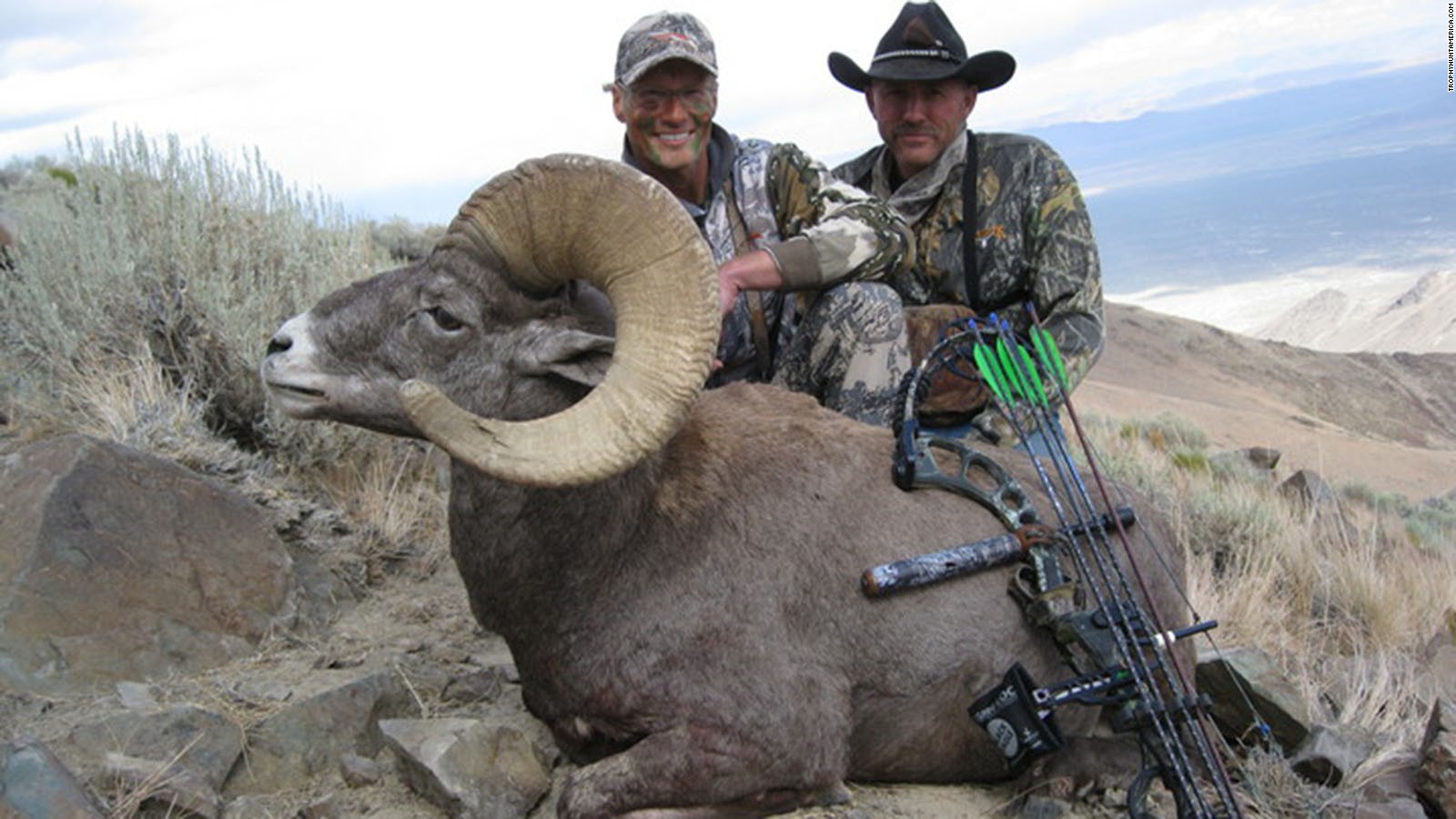(CNN)An American man is being sought in connection with a case that has drawn international attention -- the killing of Cecil the lion -- Zimbabwean officials said Tuesday.
The man suspected in Cecil's death is Walter James Palmer of Eden Prairie, Minnesota, according to Johnny Rodrigues, head of the Zimbabwe Conservation Task Force.
Cecil, who was 13, was a prized lion in Zimbabwe's Hwange National Park, where visitors reportedly sighted him frequently. A video of the animal, regal, indifferent and sleepy-eyed, has been widely disseminated.
He was a participant in a study that Oxford University in Britain was conducting, and he had been outfitted with a GPS collar.
A police official in Zimbabwe said that two Zimbabweans had been arrested in the case and that police were looking for Palmer.

Walter James Palmer, a U.S. hunter wanted for killing Cecil the lion, seen posing (on the left) with a dead ram.
An alleged $50,000 payment
The Zimbabweans, Honest Trymore Ndlovu and Theo Bronchorst, were due in court Wednesday, according to a statement from the Zimbabwe Parks and Wildlife Management Authority and Safari Operators Association of Zimbabwe. Bronchorst is a professional hunter, the statement said.
Rodrigues said Palmer was an American and gave his passport number and street address, but police were more vague. Charity Charamba, a Zimbabwe police spokeswoman, said police were seeking Palmer, "who might be an American or a Spaniard."
The allegation is that the lion was killed illegally, Charamba said.
In a statement Tuesday, Palmer, who runs a dental practice, said he hired professional guides who secured proper permits.
"To my knowledge, everything about this trip was legal and properly handled and conducted," he said in the statement.
"I had no idea that the lion I took was a known, local favorite, was collared and part of a study until the end of the hunt. I relied on the expertise of my local professional guides to ensure a legal hunt."
He said no authorities in Zimbabwe or the United States had contacted him but he would assist them in any inquiries.
The hunter concluded: "Again, I deeply regret that my pursuit of an activity I love and practice responsibly and legally resulted in the taking of this lion."

Palmer posing (on right) with dead Black Tailed deer. Palmer said he 'deeply' regrets killing Cecil the lion, and thought the hunt was legal.
Rodrigues said that Palmer "apparently paid $50,000 for the kill and we assume Theo Bronchorst received this money."
The incident may not be the first time Palmer has run afoul of the law while hunting.
A man by the same name and age, and from the same town, illegally killed a black bear in Wisconsin several years ago, according to court documents. That individual pleaded guilty to making a false statement
He knowingly made false statements to the U.S. Fish and Wildlife Service, and was sentenced to one year on probation and ordered to pay a fine of nearly $3,000, records show.
Attempts to contact Palmer's lawyer Tuesday about the 2006 case were unsuccessful. Jon Austin, a spokesman for Palmer, said he is aware of reports on the bear case, but had no information.
Wounded, then tracked for another 40 hours
Cecil's death was cruel, in Rodrigues' account.
On July 6, Rodrigues said, Bronchorst took Palmer to Hwange National Park.
"They went hunting at night with a spotlight, and they spotted Cecil," Rodrigues said. "They tied a dead animal to their vehicle to lure Cecil out of the park, and they scented an area about half a kilometer from the park," or about 550 yards.
Rodrigues said Palmer shot Cecil with an arrow but failed to kill him. Then the two men tracked Cecil, finding him about 40 hours later and shooting him to death with a gun, Rodrigues said.
They discovered that he had been fitted with a GPS collar and tried to destroy it, Rodrigues said.
Cecil was skinned and beheaded, Rodrigues said. Contrary to earlier reports, he said, the head has not been found.
"The saddest part of all is that, now that Cecil is dead, the next lion in the hierarchy, Jericho will most likely kill all Cecil's cubs so that he can insert his own bloodline into the females," Rodrigues said. "This is standard procedure for lions."
Conservation concerns
An animal protection group said Cecil's death was sad "not only from an animal welfare perspective, but also for conservation reasons."
African lion populations have fallen almost 60% over the past three decades, and as few as 32,000 of them remain in the wild, the International Fund for Animal Welfare said.
"As troubling as it is, the rarer these trophy hunted animals become, the more hunters are willing to pay to kill them -- like the American hunter who recently paid $350,000 to kill a critically endangered black rhino in Namibia," said Jeff Flocken, the fund's North American regional director.

No comments:
Post a Comment